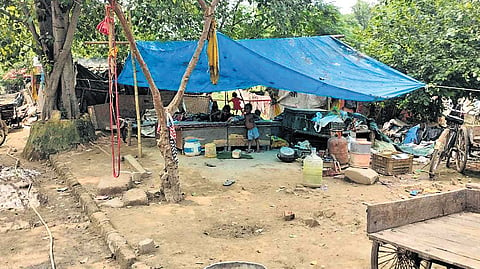

NEW DELHI: Sitting underneath the plastic sheet of a shelter which he now calls home, Ajit Kumar looks dejectedly at the fields beyond Yamuna plains. “I have no idea if I will even be able to harvest my crops this time,” the 52-year-old said.
Ajit and his family are among a dozen tenant farmers, mostly migrants from western Uttar Pradesh, who cultivate the land at Yamuna Khadar and Chilla Khadar villages near Mayur Vihar Phase—I. These villages are situated in Zone O, an area under the Draft Delhi Master Plan 2041, where farming is prohibited.
“The DDA routinely demolishes our Jhuggis and destroys our crops. For this reason, we no longer even build jhuggis and stay beneath makeshift plastic sheets,” he said.
Landlords here rent farmland for cultivation. It varies from Rs 20,000 to one lakh, depending on the crops grown.
In 2019, the National Green Tribunal (NGT) banned all farming activities in the Yamuna floodplains. This decision came after a study by the National Environmental Engineering Research Institute (NEERI) found high levels of lead in vegetables and corresponding soil samples from the floodplains.
At the same time, a report by the Central Pollution Control Board (CPCB) revealed that excessive use of fertilisers and pesticides in farming on the floodplains was polluting Yamuna’s water and floodplains.
Nirbhay Singh, who says his family has owned and cultivated land on the floodplains for generations, disputes this. “We use a small amount of pesticides, like farmers in other parts of the country. I have gotten my crops tested by multiple labs, that certify them as safe for consumption,” he said.
Meanwhile, environmentalists have said that farming does not threaten the region’s ecology. According to Bheem Singh Rawat, associate coordinator of the South Asia Network on Dams, Rivers and People (SANDRP), there is nothing wrong with floodplain cultivation. “Urban farming can improve the city’s food security and keep it green.”
At the same time, the DDA has recently been criticised for violating NGT guidelines and constructing permanent structures on the banks of Yamuna in the name of ‘restoration’.
“It is unfortunate that a land development agency has control over the floodplains. The DDA has no interest in developing the land naturally. Instead, it is concretising the area and planting non-native trees under the guise of Beautification,” said Rawat. “The management of the floodplains should be handed over to an independent body of experts including Hydrologists,” he added.